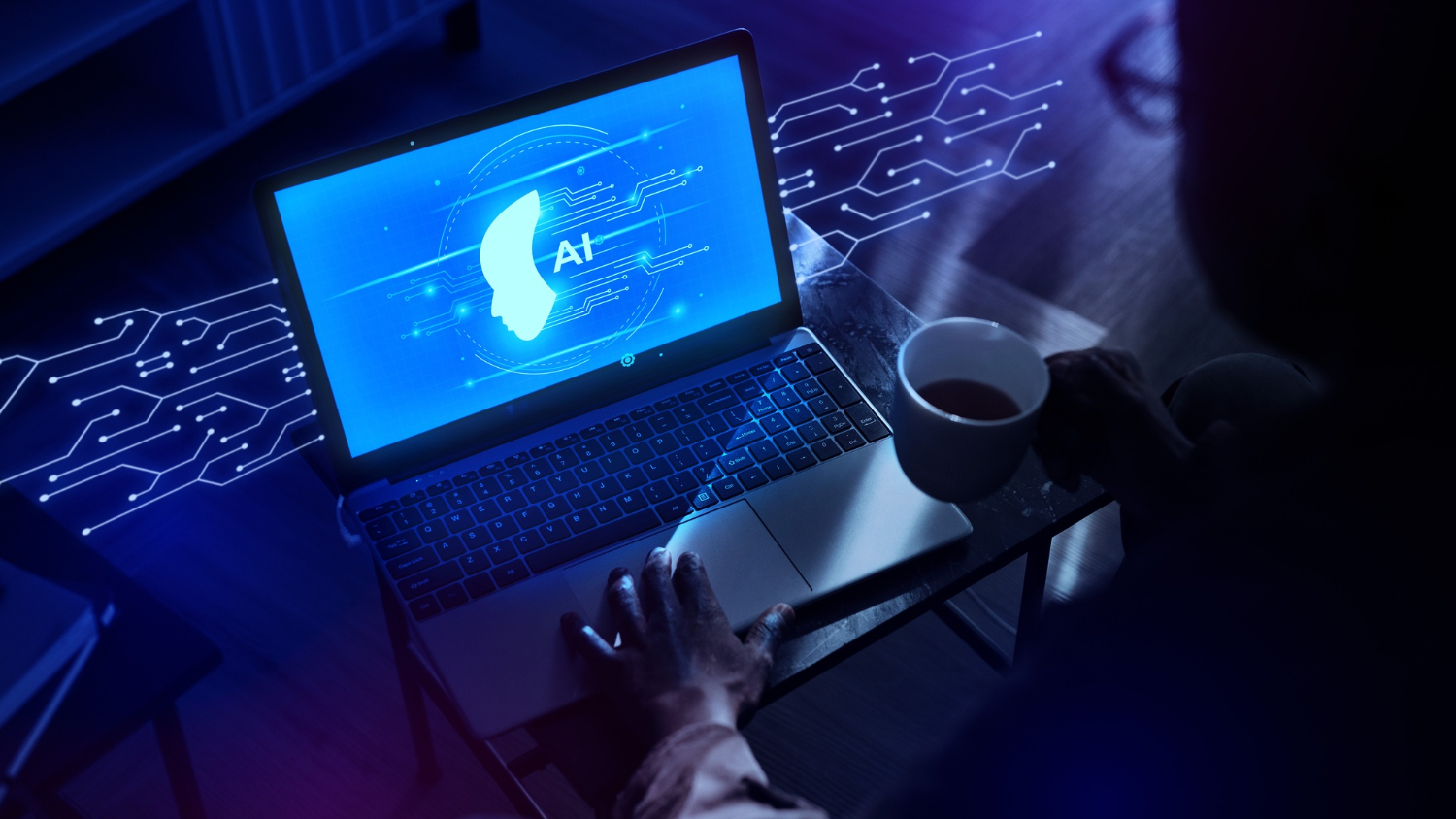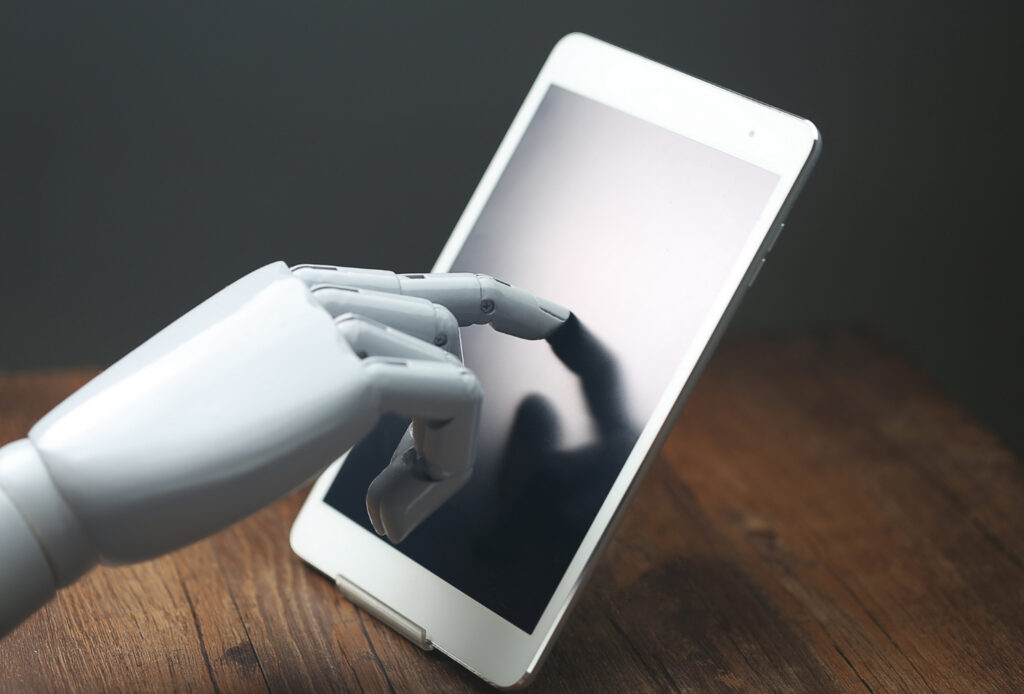M+E Daily

GenAI: Will It Be a Terminator or a Saviour?
Story Highlights
The impact of generative artificial intelligence (GenAI) on the localisation industry, the technology’s potential benefits, pitfalls and security implications, and the ethical concerns raised by GenAI were explored by AI and intellectual property experts 29 February, during the ITS Localisation event in London.
During the session “Will Generative AI be a Terminator or a Saviour?,” Matthew Blakemore, creative sector advisory group representative for the Innovate U.K. Bridge AI Programme, and Dr. Hayleigh Bosher, associate dean/reader in intellectual property law at Brunel University London, grappled with the new AI reality.
 “We’re going to start off kind of by touching on the types of AI that we’re really referring to here today, and that is content creation and content enhancement,” Blakemore said. “Because we’ve only got 20 minutes, we’re going to just quickly focus on the generative [AI] and, to really make it easy to digest, we’ve kind of broken down what we feel are the key points, the societal impact, the creativity impact, the untapped future potential, and the ethics of these solutions as well.”
“We’re going to start off kind of by touching on the types of AI that we’re really referring to here today, and that is content creation and content enhancement,” Blakemore said. “Because we’ve only got 20 minutes, we’re going to just quickly focus on the generative [AI] and, to really make it easy to digest, we’ve kind of broken down what we feel are the key points, the societal impact, the creativity impact, the untapped future potential, and the ethics of these solutions as well.”
He first discussed large language models (LLMs), saying: “I’m sure it’s probably the type of generative AI that you’ve all come across first.”
Blakemore pointed out that ChatGPT “really did make a storm when it hit the market.” The natural language processing chatbot was developed by OpenAI and released in November 2022.
“I think ChatGPT really is the one that’s taken off so much in terms of creativity impact … [but] I think there are other solutions that are really going to have a much bigger impact on the creative sector … such as image and video,” he said.
AI, Ethics and the Law
Meanwhile, “it’s really important to keep an eye on both the case law and the policy changes that are happening across the world,” according to Bosher.
“We have to ask the question … When you put something out into the world, how do we regulate it? Is it based on what you think it should be used for? Or do you base it on what people actually use it for? Because ChatGPT is used for many things. And we’ve seen in” cases, including The Pirate Bay, which had claimed, “We don’t know what people do with our website.” Whispering, she said: “Yes, they do.”
Therefore, she added: “That line of argument doesn’t always win” in content piracy. “It is worth keeping an eye on, and may have an impact in terms of how we think about AI use of content, but it may just all fall apart very quickly, and we’ll be left still not knowing.”
Image Creation
Moving on to image creation, Blakemore called that an “interesting area because we’re seeing so much improvement over the last 12 months in terms of what AI can produce.”
But he said it raises IP challenges and, “in terms of societal impact, I’ll say it’s not quite had the same impact yet as ChatGPT, but people are using these tools.”
And in terms of creativity impact, I think it’s really gold because what we’ve seen from the video models as well is often these image creative models are actually the driving force behind them.
He predicted: “The better the image models get, the better the video animation models will get, too. In terms of untapped future potential, I think we’ve seen a lot of progress in this area already, but undoubtedly there will be improvements. And obviously this raises some very interesting questions as well … around the training data and the output.”
The Key Legal Questions
In the “legal sphere, we’ve got a couple of key questions,” said Bosher.
“The first one is: Is the use of the input data copyright infringement? Do we need a license for that or not? And, if you’re on the creative industry side, you’re like, ‘obviously, yeah.’ And if you’re on the AI development side, you’re like, ‘obviously, no.’”
When she did a U.K. government parliamentary inquiry on this issue, she said, some said the law was clear on the answer.
But “that can’t be true because both sides are pretty sure about the interpretation of the law so there’s definitely some uncertainty there,” Bosher said.
 “One of the other questions is about the output,” she said. “Can the algorithm infringe the copyright of another protected work? And you’d have to think about whether the current test for copyright infringement can apply in this context because copyright’s really about the human creator. And the way that it is worded is about human creativity to apply that to AI- generated works,” which she said is “like a bit of a square peg-round hole situation.”
“One of the other questions is about the output,” she said. “Can the algorithm infringe the copyright of another protected work? And you’d have to think about whether the current test for copyright infringement can apply in this context because copyright’s really about the human creator. And the way that it is worded is about human creativity to apply that to AI- generated works,” which she said is “like a bit of a square peg-round hole situation.”
She added: “Some people say that it could apply as it is. Some people say we need policy change in order to clarify that. I would welcome some clarification personally. There’s nothing wrong with that. As you probably all know, law is never that straightforward…. We need to think about this from a policy perspective and a legal perspective, and work out whether there are changes that need to be made to the law…. What we do in the meantime – what decisions … we make as content users and creators to mitigate those risks” is complicated “when, one, you don’t really know if what you’re doing is legal or not, and two, things Open tomorrow, and that would mean that what you did yesterday turns out is illegal.”
Therefore, it seems clear there are “lots of things to think about,” she added.
Video Creation
Moving on to video creation, Blakemore said: “The interesting thing with this particular case is actually in terms of progress so far.”
Before the announcement of OpenAI’s Sora, to create videos with AI was a “very, difficult task because you had to generate animations of four seconds at a time and then tie it all together, and it was very, very difficult to get AI to actually do what you wanted.”
Now, however, “OpenAI is saying you can generate 60 seconds of video, so we’re going from 4 seconds to 60 seconds and the quality of the video they seem to be producing is incredible,” he added.
ITS Localisation was presented by MESA in association with the Content Localisation Council and Smart Content Council, and sponsored by Dubformer, Iyuno, AppTek, EIDR, Blu Digital Group, OOONA, Papercup, and Deluxe.









